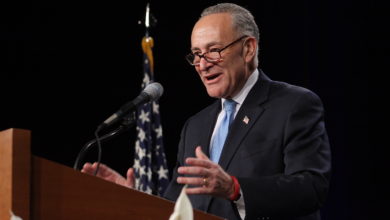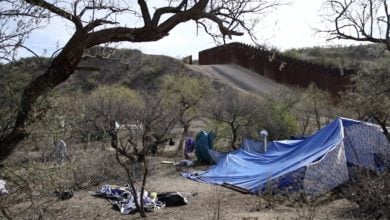On January 11 activists and community members from Seattle and across Washington state held a rally in defense of Vietnamese residents in the United States at risk of deportation. Speaking out against deportation were Viet, Lao and Khmer activists, as well as representatives from immigrant rights organizations. The message shared at the rally was that the struggles of all immigrant communities in the U.S. are bound up together, and only by collective struggle can these communities be defended.
In December the Trump administration announced a new policy for deportation of Vietnamese residents in the United States, based on a “new reading” of the existing agreement with Vietnam. The current repatriation agreement with Vietnam is outlined in a document called a Memorandum of Understanding. The current MOU was developed over more than 10 years of negotiations, finally being signed during the Obama administration in 2008. Prior to this, the Vietnamese government had strictly refused to accept any deportations from the United States, on the basis that the majority were war refugees from a war the United States had perpetrated against Vietnam.
Part of Obama’s “Pivot to Asia” strategy, and an attempt to orient Vietnam to the United States rather than towards China, the MOU represents a compromise agreement. Vietnam would accept deportations from the United States but only those who entered the country after the establishment of diplomatic relations in 1995, and only those with criminal records. Those already residing in the country as of that date, the bulk of whom are war refugees and officials of the former puppet government of South Vietnam, would be exempt. At the time of its signing the DHS forecast that approximately 8,000 Vietnamese people residing in the United States were subject to immediate expulsion, although it is not known how many were ultimately deported. This was considered by both governments to be an acceptable compromise which protected the majority of Vietnamese non-citizen residents of the United States, and those who would be least likely to re-integrate into Vietnamese society.
The supposed reinterpretation by the Trump administration would expose even those residents to threats of deportation. The DHS claims the United States does not require a new negotiation process with Vietnam in order to carry out deportations, that the agreement simply does not apply. Speaking to the The Atlantic, a spokesman for the United States Embassy in Hanoi said that while the agreement clearly does not apply to pre-1995 residents, it also does not explicitly preclude their deportation.
To call this a new reading is charitable; it is rather the typical behavior from the U.S. ruling class and their representatives to define the world, including the norms of diplomatic relations between countries, in whatever way best suits them. It is not yet known what Vietnam’s response will be to this reading of the MOU, which is up for renewal this month.
It is likely the Trump administration would pressure them to do so based on similar attempts with other countries. In 2017 the administration stepped up requests to the governments of Cambodia and the Lao People’s Democratic Republic to accept deportations. when those countries refused, visa sanctions were applied, which prevent Lao and Cambodian officials and their families from obtaining visas to the US for work or school. as with all sanctions, these represent a pressure tactic on the Lao and Cambodian governments in the hopes of forcing a change in policy.
This is the latest in a long line of attacks on immigrant communities in the United States spearheaded by the Trump administration and targeting virtually all non-white nationalities within the United States. This was pointed out repeatedly by speakers at the rally, and was also reflected in the presence of Khmer, Chinese, and Vietnamese activists speaking in solidarity with the Vietnamese community. This solidarity is exactly what is needed to oppose the racist border policies that have been escalated since Trump’s election. The theme was repeated in the route of the march following the rally. Activists and community members marched from International District/Chinatown to the adjacent neighborhood of Little Saigon.
The immediate proposal from the DHS to target immigrants with criminal records is based in a racist stereotype of most immigrants as criminals . It is also meant to gain broader support for the deportations. Speakers at the rally emphasized that due to the focus on those with criminal convictions, the threat of deportation constitutes a “double punishment,” unfairly adding deportation to all sentences. Representing the 8,600 Vietnamese residents of the United States at risk of deportation, speakers also pointed out that these are people who have already been punished, that while in prison they had been separated from families and loved ones, a punishment deportation would only repeat.
Toshiko Hasegawa, executive director of the Washington State Commission on Asian Pacific American Affairs, a state advisory board, spoke regarding the proposal and linked it to the numerous other attacks on immigrant communities by the Trump administration. She said that these policies are completely at odds with the proclaimed image of the United States as an inclusive and just society. She asked for the crowd to remember the people who have already been deported, who therefore couldn’t represent themselves at the rally.
A statement was read on behalf of an affected family who didn’t feel safe speaking publicly. It read in part: “While my husband was in prison I worked two jobs, and I was and remain the primary income for our family. I am afraid of speaking up because my employer and my coworkers could find out. My husband served his time. My family served that time alongside him. Please don’t make us serve time again by separating our family.”





